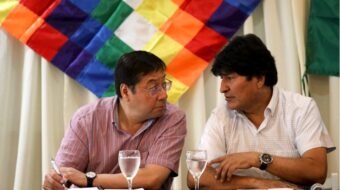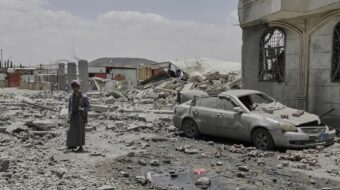Luciano Enrique Romero Molina, a Colombian trade union leader and father of four, was found dead on Sept. 11 in his home city of Valledupar. His hands were tied behind his back. He had 40 stab wounds and extensive bruising, suggesting he had been tortured.
Romero, 45, was the leader of Sinaltrainal, a union representing food and beverage workers, including some who work at Coca-Cola bottling plants. As an outspoken defender of worker rights and a critic of his country’s employer-backed, right-wing paramilitary groups, Romero was no stranger to receiving death threats. In late 2004 and early 2005 he lived abroad under an international solidarity and protection program.
Even so, no one was prepared for the grisly news of his assassination. Romero is the 37th union activist murdered in Colombia so far this year.
The union blamed Colombia’s president, Alvaro Uribe Velez, the federal government and the paramilitaries for Romero’s death. “We condemn the government and its deceptive ‘Peace Dialogue’ with the paramilitary groups that continue to massacre the defenseless population,” the union statement said, referring to a much-touted government initiative to address the problem of vigilante terror.
A new report by Amnesty International (AI) supports Sinaltrainal’s charges that Colombian paramilitary groups continue to inflict a deadly toll. The study, “Paramilitaries in Medellin: Demobilization or legalization,” points out that the Uribe government has not dismantled the country’s feared paramilitary formations but has instead permitted them to reinvent themselves as private security companies and intelligence gathering networks.
Paramilitary groups have simply been “recycled and legalized in structures more acceptable to public opinion,” the report says.
In a case study of Medellin, the country’s second largest city, the authors of the report say that after the government negotiated the demobilization of the paramilitary groups in 2003, those groups simply morphed into legal security companies that continued to murder and threaten human rights and community activists “in order to guarantee that the civilian population does not challenge paramilitary control.” They also extort money from other companies and individuals.
The AI report notes that paramilitaries continue to threaten nongovernmental organizations working in poor neighborhoods while also trying to discredit their work. Trying to extend their control over elected neighborhood councils, they use death threats to force residents to vote for their candidates and to discourage contending candidates.
Since the government program to “demobilize” the paramilitaries began in 2002, more than 2,300 people nationwide have been killed or have “disappeared” in areas under paramilitary control. AI says it is continuing to investigate new cases of human and civil rights violations committed by these forces, which also work closely with the Colombian security apparatus.
The report also charges that existing laws, including the Justice and Peace Law ratified by President Uribe on July 22, guarantee that paramilitaries and those who support them will not be investigated or punished for human rights violations. For instance, the Justice and Peace Law provides for a staff of only 20 people to investigate hundreds of accused paramilitary soldiers, and each investigation is limited to 60 days.
Further, for those persons convicted of human rights violations, the government reserves the right to send them to work in agricultural colonies in zones controlled by the paramilitaries themselves, instead of to jail. The report also says the Uribe government allows the Ministry of Defense to pay former paramilitaries to supply intelligence and to act as guides during military operations.
AI warns the Colombian government that any peace process that does not address the “corrosive affects of paramilitarism” will not work. The groups says that Colombia’s organized paramilitary groups, which were originally formed by the military in the mid-1960s to assist the army in its war against leftist guerillas, are responsible for the majority of cases of politically motivated killings, disappearances and torture.
The group calls on the government to dismantle the paramilitary networks and bring those responsible for human rights violations to trial.
The full report can be found at www.amnesty.org/library.
tpelzer @ shaw.ca









